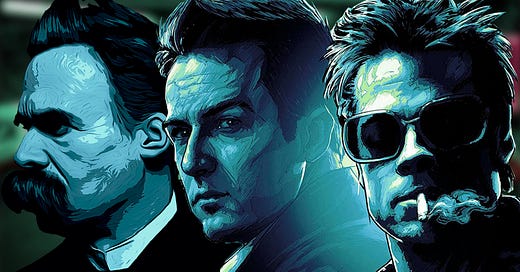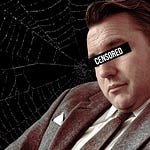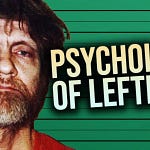Transcript
Fight Club is the most important film about the state of modern masculinity in recent memory. The 1999 classic painfully highlights the greatest disease of our civilization – namely, the emasculation of the Western man. Over the course of its narrative the film offers the viewer a radical antidote to this disease – it presents the philosophical concept of the Nietzschean’ “Übermensch”.
The nameless protagonist of Fight Club, simply described as “the Narrator”, embodies a typical late 20th century American consumer. His life is dedicated solely to the acquisition of wealth which he invests in the products of international mega-corporations. He has been thoroughly emasculated by the egalitarian conformity of postmodern society which has left him fearful, lazy and entirely mediocre. Nihilism has corrupted his soul to a point where he cannot identify a clear purpose for his existence.
His lived experience is an endlessly repeating loop of insignificant events split between the offices of his employer, business trips and the suffocating comfort of his IKEA furnished apartment. This vicious cycle of meaninglessness turns the Narrator into a chronic insomniac. He seeks comfort in a self-help group for survivors of testicular cancer. Here he meets a group of disillusioned men who suffered through actual emasculation as a result of their disease. This male safe space becomes a form of escapism for the narrator where he can feel good about himself by feeding off the misery of others. This proves to be a temporal arrangement though, as this distortion of reality evaporates immediately when a girl named Marla Singer joins their group which subconsciously reminds the protagonist of his own emasculation. Secretly he is attracted to her but remains in denial about this fact to avoid facing his own impotence.
His insomnia resurfaces, which results in dissociative identity disorder.
This is where the plot introduces Tyler Durden, who is – unbeknownst to the Narrator – a projection of his deranged mind. Tyler signifies his innate desire to overcome emasculation and nihilism. This becomes the main conflict of the Narrator’s character arc: His old impotent self struggles against his new hypermasculine identity for dominance. Ultimately, the story is all about becoming who one really is.
Tyler’s strategy to guide his other half towards “enlightenment” is preaching a contemporary interpretation of Nietzschean’ philosophy. The film itself functions as an allegory for the Philosopher’s 19th century magnum opus – the book ‘Thus Spoke Zarathustra’. The central story here revolves around the character Zarathustra, who preaches to the great unwashed masses that ‘God is dead’ and therefore man has to evolve or be annihilated. In it, Nietzsche also offers a harsh critique of Western Christianity:
According to him, its most emphasised value was humanities search for truth which it offered in form of its own dogma. This caused civilisation to perpetually seek truth which culminated in the discovery of the scientific method and the emergence of the age of enlightenment in the 18th century. This in turn resulted in the decline of Christianity in the West. The implication of this was a dark one however, because the refutation of this highest of all beliefs created cynicism towards all other supposed meta-truths and values. Existential nihilism – the belief that there is no objective meaning to existence – has become the dominant quasi religion of Western civilization ever since. Zarathustra orates to the masses about the dangers of nihilism, as the disability of values leads to the era of the ‘Last Man’: A period in which man stagnates because of his lack of purpose. He therefore turns away from creation towards endless consumption and apathy.
At this point we return to Fight Club and to the Narrator, who represents the contemptible ‘Last Man’. His attitude is cynical and pessimistic, despite the supposed fulfilment he finds in mindless consumption. Deep down however, he is aware that his time is slowly running out and he is achieving nothing in the process. [This is your life and it’s ending one minute at the time.] His namelessness or in other words interchangeability echoes the masses of ‘Thus Spoke Zarathustra’, who are also aware that they are numbing the chronic meaninglessness of their lives with hedonistic consumption. Greater men, such as Zarathustra himself - or those who take action and create - are secretly envied, but publicly ridiculed. People end up conforming to the mediocrity of their neighbours, either because they fear the ‘public shaming’ or are just outright lazy, which applies to most men. This exemplifies Nietzsche’s idea of slave morality, which entails a mindset of obedience, patience and humility.
The result is postmodern society as we know it, which preaches weakness and pacifism as virtues and elevates victimhood to sainthood. The weak despise the strong and therefore start to attack their achievements with vitriolic slander. The masses eradicate individualism from within and turn Western civilization into an egalitarian and declining nightmare.
Tyler Durden takes on the role of Zarathustra in the internal dialogue of the Narrator and preaches to himself about the decline of civilization. [Murder, crime, poverty – these things don’t concern me (…) let’s evolve, let the chips fall where they may!] He rejects the notion that the accumulation of property by mindless labour can be an inherently meaningful task as it rather takes away from our ability to focus on pursuits that really matter. [The things you own end up owning you.] In a cataclysmic event, the apartment of the Narrator is destroyed by an explosion, which accelerates his personal transformation. This readjusts his focus onto self-actualization, a process which he visualizes in his interactions with Tyler.
A key aspect of Tyler’s approach is the theme of self-destruction or as he puts it [Self-improvement is masturbation, self-destruction however…] He encourages the Narrator to punch him after their first meeting in Lou’s Tavern. This escalates into a full contact fight. This kind of rough play breaks up the inner wiring of the ‘Last Man’ type Narrator. According to Nietzsche, the emergence of existential nihilism coincides with the return of death anxiety. Western man has lost his faith in the afterlife as a positive outlook. The suffering experienced throughout a lifetime is therefore amplified, because there is no heavenly salvation to comfort the pain. Postmodern civilization is mostly concerned with numbing this exact pain. It denies suffering as a critical element of the human experience, demonizes any form of violence and promotes hedonistic escapism. The desire to build a society that denies the value of pain and suffering is a deeply utopian one, which leads to the constant expansion of the state.
It offers to protect is citizens from death while simultaneously providing pleasure and comfort. Nietzsche is disgusted by this idea, as he believes that the state turns human beings into mere herd animals that live ignorant of their own mortality and without purpose. Instead he proposes to face one own’s mortality head on, which is necessary to overcome death anxiety. He rejects the other worldliness that both Christianity and the secular state offer to mankind.
The fight with Tyler introduces the Narrator to the idea of embracing pain and suffering as something that is as much part of the human experience as pleasure and comfort. Self-help groups only served him to deny the inevitable physical destruction of his human body. Fights on the other hand allow him to confront his own impermanence. [Hey, even the Mona Lisa is falling apart.]
This sort of rewiring becomes very appealing to other ‘Last Man’ types that witness the Narrator fighting himself.
They too, are castrated by the life denying, comfort-seeking and escapist culture of corporate America. Within a few weeks, a Fight Club is founded where men meet to fight on a weekly basis. In the basement of Lou’s Tavern, the disaffected men find spiritual salvation in violence – for they rediscover the purpose of masculinity.
Testosterone was not an accident of evolution. A man’s natural traits are increased strength and aggression. This was essential to protect and provide for one’s offspring, a role without which civilization would have never been possible. Contemporary society supplants the traditional role of the individual man with the state monopoly on violence. Consequentially, it feminizes men by supressing their biological tendencies. Some men, however, will never be pacified. The truth of the matter is that men were created to suffer. Men were born to fight. And therefore, men were born to create. Creation is not a passive process, as it requires the input of force.
Nietzsche once formulated: Every creation requires some form of destruction. The Übermensch is aware that his life will end in annihilation, so he overcomes the plain will to live and rather embraces the will to power. He shapes his environment through force to create something that will outlast his short existence. But in order to do that, he has to accept enduring pain, suffering and destruction as part of the process. The frustrated ‘Last Men’ discover these two crucial truths in Fight Club: The first is that they have to confront hardship to truly accept the inevitability of death. The second is that they have to destroy their postmodern self-conception before overcoming their emasculation to create something new.
It is revealed that Tyler set the Narrator onto this path by destroying his old condo. This forcibly detaches the protagonist from his materialistic obsession and is the first step towards destroying his postmodern self-conception.
Tyler however understands that rejecting materialism and joining a fight club is not quite enough to fundamentally rewire the Narrator. A part of him is still clinging to his former self, because in his core he is still fearful, which prevents him from taking any meaningful action. Tyler emphasizes the act of human sacrifice as the ultimate expression of heroism in the face of certain annihilation. Enduring and accepting the value of pain is a trait of higher men. The Narrator, however, is initially incapable of that, despite him claiming to be enlightened. [I am enlightened.] [Can I see your hand please? (…) Congratulation, you are one step closer to hitting bottom.] What Tyler achieves in this scene is highlighting the dilemma of existential nihilism. If god has abandoned us, we are faced with two options: We can either escape from reality or we can face the fact that nobody but ourselves will save us from our mortal suffering.
To choose the latter one has to be clear minded and brave – fear on the other hand would only lead back to the former. Nietzsche himself believed that the highest must come to its height out of the deepest depth, meaning that man has to hit bottom to truly grasp the finiteness of his own existence. Only then can he positively embrace his short life and evolve into the Übermensch, who creates his own purpose and takes action to fulfil it.
Tyler continues to introduce the other men of Fight Club to the idea that they belong to a generation of ‘Last Men’ who have been turned into a homogenous and purposeless herd of Western consumers misguided by a set of false expectations. [Man, I see in Fight Club the strongest (…) and we are very pissed off.] He attributes great unfulfilled potential to the members of Fight Club which mirrors Nietzsche’s idea of the higher man.
The philosopher accurately concludes that the decline of Christianity inevitably led to the emergence of egalitarian mass movements throughout the Western world. They all share direct lineage to their religious ancestor however, because Christian morality originally popularized the concept of the blank slate: Man was created in the image of God and therefore contains an element of divinity within his soul. Nietzsche sees this dogma of fundamental equality as a poison for mankind however, because it is used by the mediocre mass to enforce slave morality. He despises both socialism and liberal democracy as unnatural ideologies that will lead to the dominance of the nihilistic herd over the Western world until the end of the 21st century.
In Nietzsche’s book, the prophet Zarathustra ultimately comes to the conclusion that the masses are unwilling to accept the significance of the Übermensch as the antithesis to the degenerate Last Man for the sake of civilizational survival.
Instead he assembles a group of higher men, in whom he sees the potential for greatness and a willingness to transcend the egalitarian grip of the herd. Tyler mimics this approach by building a group of dedicated followers, who seek to overcome the emasculating nature of contemporary Western society. Fight Club transitions to Project Mayhem, where recruits have to prove their perseverance before discarding the fake individualism that consumer and adverting culture has sold too them. [You are not your job. (…) all dancing crap of the world.] What unites these men is that their life is without purpose or meaning, and so they decide to sacrifice themselves for a greater idea. [Like a space monkey ready to be shot into space.] Tyler prepares them for a spiritual war to overthrow the unnatural order of postmodern society. [Snowflake …Tyler was building himself an army.] His ultimate goal is the destruction of the Last Man mentality that has created a civilization of mediocrity and decline.
The group initially vandalises various inanimate objects, targeted specifically because they symbolise the corporate mentality of Western consumer culture. The narrator grows increasingly uncomfortable with this situation as he fears the ever-expanding scope of Tyler’s movement. This reveals his remaining attachment to the established order, mostly because he fears the consequences of overthrowing it. In his mind, Fight Club was intended to be a high-level self-help group and should have never evolved into anything greater. This, however, would have meant that the weekly basement fights would have been nothing more than a way for these men to escape the emasculating nature of their everyday experience. Escaping into an imaginary ice cave during a self-help seminar or escaping into the basement of a local bar – neither would have been fundamentally different. Tyler understands that Fight Club could only ever serve as an introduction to a dissident mindset, but the logical endgame would have to be the establishment of a new civilizational order.
Project Mayhem is the practical implementation of this ambition: Its primary purpose is to destroy centralized financial institutions to accelerate the inevitable collapse of the current system. Its secondary purpose is to create a decentralized network of spiritual warrior-types, who will form the aristocratic backbone of the new order that will arise from the resulting state of chaos. Furthermore, this elite could form intellectual institutions to preserve and emphasize the traditionally masculine traits of individual heroism, sacrifice and creation. The Übermensch will be born out of the dark cloud that is mankind and will implement this process by what Nietzsche describes as the re-evaluation of all values. This will challenge conventional slave morality and ultimately aims to fill the nihilistic void that was left by the metaphorical death of God with a new set of values that emphasizes self-mastery over the human mind. The values of materialism and egalitarianism will be rejected for their emasculating and inauthentic nature. [In the world I see (…) strips of venison in the empty carpool of an abandoned superhighway.]
The Narrator lives through a so-called “near life” experience in form of a car crash after which his psychological alter ego and quasi-father figure Tyler abandons him. This allows the Narrator to witness the progression of his own movement, which immediately frightens him, especially once he realises that people are actually sacrificing themselves for this greater cause. [They shot bob in the head.] Upon further investigation he learns that Fight Club chapters have sprung up across the country, which leads him to the discovery of Tyler’s true nature as part of his imagination. [Why would anyone confuse us? … Because we’re the same person.] It is revealed that the Narrator invented Tyler to circumvent the hardwired belief system imposed onto him by postmodern society. [You were looking for a way to change your life…I am free in all the ways you are not.] This represents the process of becoming oneself as described by Nietzsche.
By rejecting the deluded vision of how a Western man ought to behave as defined by the system itself and embracing a lifestyle that embodies the nature of what a human man actually is, the Narrator slowly but surely becomes an individual among a herd of nameless Last Men.
The struggle to accept Tyler Durden as the authentic identity of the Narrator is the ultimate purpose of the film Fight Club. This can only be achieved by destroying the inauthentic aspect of his identity - a process that naturally leads to resistence by the former self in a desperate bid to survive. The Narrator hands himself to the local police department and informs them about Project Mayhem in an attempt to sabotage the planned attack on the beforementioned financial institutions. The PD however has been infiltrated by members of Project Mayhem, who then attempt to physically castrate the Narrator.
Sabotaging the movement that lifted the Narrator out of a state of apathy and nihilism to protect the status quo proves that he is still very much emasculated by the system. He successfully defends himself against his own men however and manages to escape. [I ran until my legs were pumping battery acid…then I ran some more.] In the penultimate scene the inner conflict between the Narrator and Tyler is visualized, wherein the former is eviscerated by the latter. Finally, the protagonist throws himself off a staircase, hitting rock bottom in a metaphorically Nietzschean’ sense. The Narrator now finds himself engaged in a last imaginary conversation with Tyler. [This is what we want … its already done so shut up.] At this point he has endured a maximum of pain and suffering. He cannot stop the following events, but for the first time he takes action on his own initiative. It is in this moment that he becomes proactive by firing the gun into his mouth without regard for his life. [My eyes are open Tyler.]
This act symbolises his transformation from a disillusioned nameless consumer to the individual Tyler Durden, who embodies the qualities of Zarathustra’s Übermensch. He accepts suffering and death as part of the human experience and does so without fear in a clear state of mind. By pulling the trigger, he willingly removes all attachments to his previous life and the expectations of postmodern society while fully embracing the possibility of immediate annihilation. It is in this moment, that his former self is destroyed, as he regains his masculinity by taking action and sacrificing himself for a higher purpose. He gives up all illusions of hope or control, because they have been pacifying him his entire life. Tyler regains the freedom to give his life meaning, because all distractions evaporate the second he faces his mortality head on.
The bullet passes through his cheek but metaphorically kills the projection of Tyler because it has become superfluous now.
By killing his imaginary father figure, Tyler becomes his own man, independent and free to make his own decisions. This reflects the essence of Zarathustra’s teachings in which god is the father and upon his death mankind has to overcome its own mediocrity to reach a higher state of being and fill the void of nihilism with meaning. Consequentially, Tyler accepts not only his new self, but also his final break with postmodern society symbolised by the climatic explosion and most importantly his desire for Marla Singer. She was the reason why his impotence escalated into the creation of his imaginary hypermasculine alter ego - his character transformation now allows him to finally overcome emasculation by engaging in an honest romantic relationship. This is punctuated by a single vulgar frame that flashes across the screen during the last shot of the film: [A nice big cock.]
All in all, Fight Club is not a simple story, but it is one that is relatable to many men of our generation. It reflects Nietzsche’s belief that Western civilization has been descending into mediocrity ever since the self-destruction of traditional Christian values. Western men are suffering from a disease that can only be described as emasculation resulting from existential nihilism and death anxiety. Instead of heroically facing the inevitability of their physical annihilation, they seek refuge in meaningless activities such as hedonism, consumerism and self-improvement. The resulting postmodern society is one that is defined by lazy, fearful and impotent Last Man types, that drag each other down under the pretence of equality. Fight Club depicts the spiritual path of one such man to step over his meta-physical impotence and ultimately the system itself, by embracing pain and suffering courageously. Only once he has sacrificed his former psychological self-conception can he regain his masculinity and with it the freedom to create a meaningful existence.













Share this post